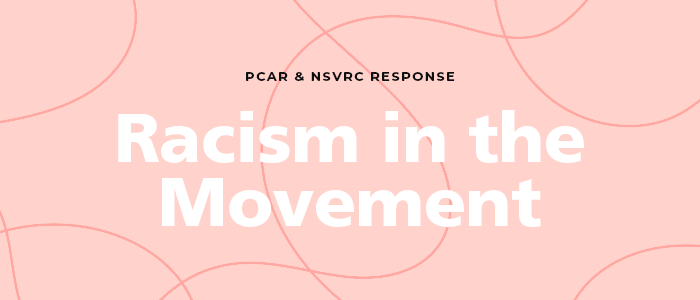By PCAR Management Staff
A recent Mother Jones article discussed what many have known to be true for a long time: that racism - Anti-Blackness, specifically - exists and persists in our movement to end sexual violence. The article, How the Mainstream Movement Against Gender-Based Violence Fails Black Workers and Survivors, written by Madison Pauly, captures the lived experiences of several Black colleagues. We thank them for sharing their experiences and truths. We uplift and support what they have said. We also acknowledge that there are many more voices and stories of racism in the movement.
We see ourselves in this article. PCAR is the oldest state anti-sexual violence coalition in the nation. With that history, comes the fact that we were built on a system of white supremacy - institutions, policies, norms, and values that are built by and for white people and actively work to oppress communities of color. We acknowledge that we have acted in harmful ways toward Black colleagues, participated in performative allyship, participated in power- and resource-hoarding, and have not always worked collaboratively with Black, Indigenous, and colleagues of color.
We are at a pivotal moment in the movement to end sexual violence and in our organization: we either listen and do the work needed to change, or we will continue to actively cause harm toward Black advocates and survivors. White staff, particularly those in management and leadership positions, must be committed to and actively seek out a lifetime of anti-racism learning and actions, both personally and professionally. We must ask ourselves, what if this article was written about instances of sexual abuse or harassment instead of racism? As sexual violence advocates, we believe the survivor. This is our same imperative in instances of racism -- believing and affirming the voices and experiences of those who have been impacted. Acts of racism and discrimination are just as harmful and must be taken just as seriously.
We recognize and acknowledge that there are various ways we could and should have acted to intervene when harm was happening, and we know there are concrete ways we can work to prevent these harms from happening in the first place. The management and leadership staff of PCAR acknowledge our role in harm caused to Black colleagues, and our participation in the gender-based violence field’s history of racism, discrimination, and inequity. By sharing their stories, Black advocates have provided us with the gift of a roadmap for ways we can work to repair harm and move forward in dismantling systems of oppression in our work. We commit to aligning with, supporting, and uplifting what they have said. In doing so, we ask ourselves, what are we currently doing, what can we do better, what can we learn, and how can we grow?
While we continue to change our internal culture, we would like to share some actionable steps that we’re taking to become an anti-racist organization.
- We have signed on to the Moment of Truth letter along with other anti-violence organizations. We are in regular communication with many partner organizations in this movement, sharing ways we are being intentional in our anti-racism efforts, and reaching out for help and support along the way.
- We are collaborating with Black leaders in this work to capture the stories of anti-Blackness in the gender-based violence movement through podcasts. Our leadership and management teams will be listening to these stories and creating concrete action steps we can take as an organization to stop anti-Blackness both organizationally and in the movement.
- With our funding we actively seek to partner with and adequately compensate organizations that serve communities of color.
- White staff participate in monthly meetings to talk about how White Supremacy Culture shows up in our personal lives, in our organization, and in our movement, and discuss concrete ways to dismantle this. And our board participates in anti-racism efforts.
We urge our white-led organizations and white colleagues in the field to have transparent conversations and ask themselves the same questions: what are you currently doing, what can you do better, what can you learn, and how can you grow? Then create a plan, which includes accountability measures, of actionable steps to become an anti-racist and inclusive organization.
For Further Reading and Reflection:
Moment of Truth Letter from State Coalitions
Here and There: An open letter to white women in the movement to end gender-based violence (Arlene C. Vassell)
Dear White People…10 Ways You Can Show Up for your Black Friends and Colleagues (Colorlines)
Black Women and Sexual Assault (The National Center on Violence Against Women in the Black Community)
When Truth is Justice and Not Enough: Executive Summary to the Black Women’s Truth and Reconciliation Commission Report (Black Women’s Blueprint)
White Supremacy Culture (Tema Okun)

